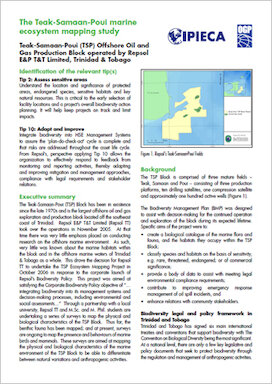This case study explains the ecosystem mapping project Repsol have undertaken at the Teak-Samaan-Poui (TSP) block located off the southeast coast of Trinidad. Through a partnership with a local university, Repsol are undertaking a series of surveys to map the physical and biological characteristics of the TSP Block. Thus far, the benthic fauna has been mapped, and surveys are ongoing to map the presence and behaviours of marine birds and mammals. These surveys are aimed at mapping the physical and biological characteristics of the marine environment of the TSP Block to be able to differentiate between natural variations and anthropogenic activities.
Ecosystem mapping: Repsol case study

14 October 2012
Share this resource
Related resources
- 16 October 2024
This document provides examples of how Ipieca companies are taking ambitious biodiversity actions which contribute towards the goals of the Global Biodiversity Framework.
View
- 10 August 2016
Petroleum Development Oman (PDO) / Shell.
Oman -Since 2011, a third of produced water from the Nimr oil feed in Oman has been treated in a purposely built reed bed facility.
View
- 16 March 2016
At Shell's Groundbirch venture, British Columbia, the local area is prone to water shortages. In order to minimise freshwater use, Shell and the City of Dawson Creek ...
View
- 11 August 2015
In-house water risk assessment tool strengthens Repsol's water management performance
View



